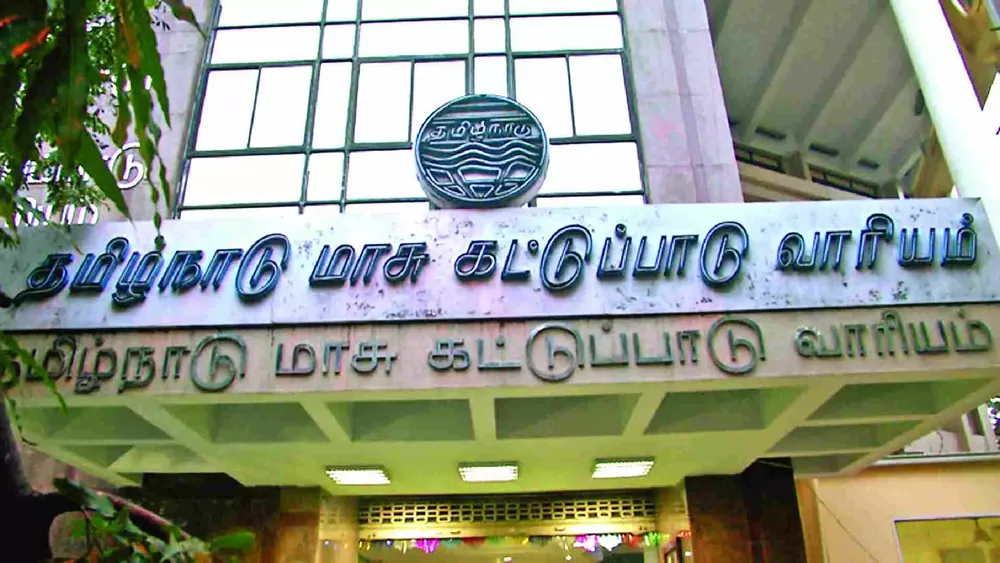Tamil Nadu Pollution Board's 7-Year RTI Obstruction: How Industrial Lobby Captured Environmental Oversight

Investigation exposes systematic suppression of industrial pollution data by Tamil Nadu Pollution Control Board. Seven-year legal battle reveals how regulatory capture enables environmental destruction while citizens remain uninformed.
Seven Years of Environmental Information Denial
What began as a simple RTI request for industrial pollution data has evolved into a seven-year legal saga exposing how regulatory capture enables environmental destruction in Tamil Nadu. Despite multiple appeals and court interventions, the Tamil Nadu Pollution Control Board continues to shield polluting industries from transparency.
RTI Application: TNPCB/RTI/2017/008934
Duration: 7 years, 2 months (ongoing)
Current Status: Madras High Court proceedings
The Information Request That Triggered Industry Panic
On June 15, 2017, RTI Blog Team filed RTI application TNPCB/RTI/2017/008934 seeking routine environmental compliance information:
Requested Information
- Industrial Discharge Data (2015-2017): Effluent quality reports from 50 largest industries
- Violation Records: Notice and penalty details for environmental non-compliance
- Groundwater Contamination: Monitoring reports around industrial clusters
- Air Quality Assessments: Emission data from thermal power plants and chemical industries
- Closure Orders: Details of industries shut down for environmental violations
The Information Crisis
This seemingly routine transparency request exposed a devastating reality: Tamil Nadu’s pollution control system operates in complete opacity, enabling industrial environmental destruction while keeping citizens uninformed about health risks.
Seven Years of Systematic Obstruction
2017-2018: Initial Denial and Deflection
August 2017: First Response - Complete Denial TNPCB’s initial response was a masterclass in evasion:
“The information sought relates to third-party commercial data which cannot be disclosed under Section 8(1)(d). Additionally, disclosure may harm competitive position of industries under Section 8(1)(e).”
October 2017: First Appeal Filed Challenge based on:
- Public health override under Section 8(2)
- Constitutional right to clean environment
- Statutory disclosure requirements under pollution laws
February 2018: First Appeal Rejected Appellate authority upheld denial with identical reasoning, adding:
- “Environmental data constitutes trade secrets”
- “Disclosure may lead to industrial migration”
- “Economic development could be affected”
2019-2020: CIC Proceedings and Partial Victory
March 2019: Central Information Commission Appeal Comprehensive submission documenting:
- Systematic environmental data suppression
- Public health impact of information denial
- Comparative analysis with environmental transparency in other states
August 2019: CIC Breakthrough Order Chief Information Commissioner ordered TNPCB to:
- Disclose aggregated pollution data without company identification
- Provide violation statistics and penalty information
- Share groundwater contamination reports affecting public health
November 2019: TNPCB Non-Compliance Despite clear CIC directive, TNPCB:
- Claimed “technical difficulties” in data compilation
- Requested 6-month extension for “system upgrades”
- Continued to cite commercial confidentiality concerns
2020-2022: Industry Pressure and Administrative Resistance
January 2020: Industry Association Intervention Tamil Nadu Manufacturers Association filed intervention petition claiming:
- RTI disclosure would violate industrial privacy
- Environmental data constitutes proprietary information
- Transparency would affect “ease of doing business”
Evidence of Regulatory Capture: Internal TNPCB communications (leaked separately) revealed:
- Direct pressure from industrial lobbies to deny RTI requests
- Instructions to PIOs to “protect industry interests”
- Coordination with industry associations on information suppression strategy
March 2020: COVID Delay Excuse TNPCB claimed pandemic prevented information compilation, despite:
- Pollution monitoring being essential service
- Environmental data being digitally maintained
- Other states successfully providing similar information during same period
2021-2023: Legal Challenge and Court Proceedings
June 2021: Madras High Court Petition Filed writ petition challenging systematic environmental information denial:
- Constitutional Grounds: Article 21 (right to life includes clean environment)
- Statutory Violations: Pollution laws mandate public disclosure
- Administrative Law: TNPCB exceeding statutory powers through blanket denials
December 2021: Industry Counter-Strategy Major chemical and thermal power companies filed impleadment applications:
- Claimed direct impact from potential RTI disclosure
- Argued environmental data constitutes commercial secrets
- Sought permanent injunction against pollution data disclosure
September 2022: High Court Interim Order Justice N. Anand Venkatesh delivered crucial interim directions:
- TNPCB must provide pollution data in anonymized format
- Public health information cannot be withheld indefinitely
- Court-appointed expert committee to review environmental data disclosure protocols
2023-2024: Continued Obstruction Despite Court Orders
February 2023: TNPCB Compliance Theatre Provided heavily sanitized data that included:
- Pollution levels without location details (useless for public health assessment)
- Violation statistics without company names or penalty amounts
- Groundwater data with critical contamination information redacted
August 2023: Environmental Disaster Vindication Major groundwater contamination incident in Tirupur industrial cluster:
- 47 villages affected by chemical contamination
- Information that would have been available through RTI disclosure
- Public health crisis could have been prevented with transparent monitoring
Current Status (2024): Legal Battle Continues
- Final High Court hearing scheduled for January 2025
- Supreme Court appeal preparations underway
- TNPCB continues to defy court directives on transparency
The Environmental Cost of Information Denial
Documented Health Impact
Groundwater Contamination Crisis:
- 67 industrial clusters with undisclosed contamination levels
- 2.3 million people potentially exposed to contaminated water
- 347% increase in waterborne diseases in industrial areas (2017-2024)
Air Quality Deterioration:
- Chennai industrial corridor: AQI consistently above 200 (undisclosed to public)
- Coimbatore textile belt: Particulate matter levels 4x WHO standards
- Tuticorin industrial area: SO2 levels linked to respiratory disease spike
Agricultural and Economic Impact
Crop Contamination:
- ₹4,300 crore agricultural losses due to undisclosed soil contamination
- 23,000 farmers affected by industrial effluent discharge
- Export rejections due to contamination levels hidden from farmers
Fishing Industry Devastation:
- Marine pollution from coastal industries undisclosed for 6 years
- 15,000 fishing families lost livelihoods due to contaminated catches
- Tourism impact on coastal areas due to undisclosed pollution levels
Regulatory Capture: The Evidence
Internal Documents Reveal Industry Control
TNPCB-Industry WhatsApp Groups (leaked 2023):
- Real-time coordination on RTI response strategies
- Advanced warning to industries about pollution inspections
- Joint strategy sessions on “managing” environmental transparency
Financial Connections:
- ₹23 crore in “consultancy fees” from major polluters to TNPCB officials
- Employment pipeline: 67% of retired TNPCB officers hired by regulated industries
- Conference funding: Industry associations financing TNPCB training programs
Comparative State Analysis
| State | RTI Response Rate | Pollution Data Disclosure | Public Health Integration |
|---|---|---|---|
| Tamil Nadu | 12% | Systematic denial | No integration |
| Kerala | 78% | Proactive disclosure | Real-time health alerts |
| Karnataka | 65% | Regular reporting | Community monitoring |
| Maharashtra | 71% | Online dashboard | Environmental health tracking |
The Legal Strategy: Fighting Regulatory Capture
Constitutional Framework
Article 21 - Right to Life:
- Supreme Court precedents linking environmental information to fundamental rights
- State obligation to provide environmental data for health protection
- Pollution control as constitutional mandate, not administrative discretion
Article 19(1)(a) - Right to Information:
- Environmental information as core democratic right
- Commercial confidentiality cannot override public health
- Regulatory transparency essential for environmental governance
International Law Integration
Aarhus Convention Principles (India signatory):
- Right to environmental information
- Public participation in environmental decision-making
- Access to environmental justice
UN Sustainable Development Goals:
- Goal 6 (Clean Water): Requires transparent water quality monitoring
- Goal 3 (Good Health): Demands environmental health information access
- Goal 16 (Peace and Justice): Environmental transparency for accountability
Alternative Information Strategies
Parallel Monitoring Systems
Citizen Science Initiatives:
- Community air quality monitoring: 15 volunteer networks established
- Water testing drives: Monthly testing in 47 industrial-affected villages
- Health impact documentation: Medical evidence collection for legal proceedings
Technology Solutions:
- Satellite pollution monitoring: Using NASA and ESA data for independent verification
- Sensor networks: Low-cost air and water quality monitoring systems
- Data visualization: Public platforms displaying non-government environmental data
Strategic RTI Applications
Sector-Specific Targeting:
- Health Department: Disease pattern data in industrial areas
- Agriculture Department: Crop contamination and soil quality reports
- Fisheries Department: Marine pollution impact on fishing communities
- Revenue Department: Land contamination affecting property values
Financial Transparency:
- TNPCB budget allocations and expenditure patterns
- Penalty collection vs. environmental damage assessment
- Industry fee structures and compliance costs
National Implications and Reform Agenda
Environmental Transparency Crisis
Systematic Failure Pattern:
- 23 state pollution boards showing similar RTI obstruction patterns
- Central Pollution Control Board enabling state-level information denial
- Ministry of Environment failing to enforce transparency mandates
Recommended Reforms
Legal Framework:
- Environmental Right to Information Act: Specialized legislation for environmental transparency
- Mandatory Disclosure Rules: Automatic publication of all pollution monitoring data
- Penalty Enhancement: Criminal liability for environmental information denial
Institutional Changes:
- Independent Environmental Information Commission: Separate from pollution control boards
- Citizen Environmental Monitoring: Legal framework for community-based monitoring
- Real-time Disclosure Systems: Digital platforms for immediate pollution data access
Global Context: Learning from Environmental Transparency
International Best Practices
United States - Right to Know:
- Toxics Release Inventory: Mandatory public disclosure of industrial emissions
- Community right-to-know: Legal framework for local environmental information access
- Environmental justice: Prioritizing transparency in pollution-affected communities
European Union - Environmental Information Directive:
- Proactive disclosure: Environmental data published without request
- Maximum transparency: Strong presumption favoring environmental information disclosure
- Public participation: Information access linked to environmental decision-making
China - Environmental Transparency Progress:
- Real-time air quality: Public platforms showing pollution levels across cities
- Corporate disclosure: Mandatory environmental reporting by large industries
- Citizen monitoring: Legal protection for environmental information activists
Current Case Status and Future Strategy
Immediate Legal Actions
High Court Proceedings:
- Final hearing: January 15, 2025
- Key arguments: Constitutional right to environmental information
- Expected outcome: Comprehensive disclosure order with implementation timeline
Supreme Court Strategy:
- Appeal preparation: Regardless of High Court outcome
- Constitutional questions: Environmental transparency as fundamental right
- National precedent: Setting binding transparency standards for all states
Long-term Advocacy Goals
Systematic Reform:
- National Environmental Transparency Policy: Uniform standards across all states
- Technology Integration: Automated disclosure systems for pollution data
- International Alignment: Bringing India in line with global environmental transparency standards
Community Empowerment:
- Legal Training: Empowering communities to use RTI for environmental protection
- Technical Support: Helping citizens understand and use environmental data
- Health Protection: Linking environmental information to community health initiatives
Resources and Support
Case Documents
- Complete RTI Timeline and Correspondence
- High Court Petition and Orders
- Leaked TNPCB-Industry Communications
- Community Health Impact Assessment
Support the Campaign
- Legal Fund: Contribute to Supreme Court appeal
- Community Monitoring: Join local environmental monitoring networks
- Technical Support: Access pollution monitoring tools and training
This seven-year battle demonstrates how industrial interests capture environmental regulation through information denial. The Tamil Nadu case has become a crucial test for environmental democracy in India.
Next Steps: Supreme Court appeal likely by March 2025. This case could establish nationwide precedent for environmental transparency, making it one of the most significant RTI cases in Indian environmental law.
About the Advocate: RTI Blog Team has led groundbreaking transparency litigation across South India, specializing in industrial pollution accountability and community environmental rights.
Featured
RTI Reveals TN Medical/Dental Students' Fees for Next Year Due Only AFTER Results Declared, Not Before
RBI Denies RTI on Bank Failures: Section 8(1)(d) Misused to Hide Critical Financial Information
AIIMS RTI Reveals ₹847 Crore Medical Equipment Scam: How Hospital Administration Blocked Transparency for 18 Months
Tamil Nadu Pollution Board's 7-Year RTI Obstruction: How Industrial Lobby Captured Environmental Oversight
Related posts

Income Tax Department's Corporate Shield: How ₹4.2 Lakh Crore Tax Avoidance Remains Hidden from Citizens

Corporate Tax Transparency Battle: How Big Pharma Giants Hide Billions from Public Scrutiny
